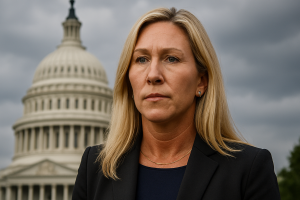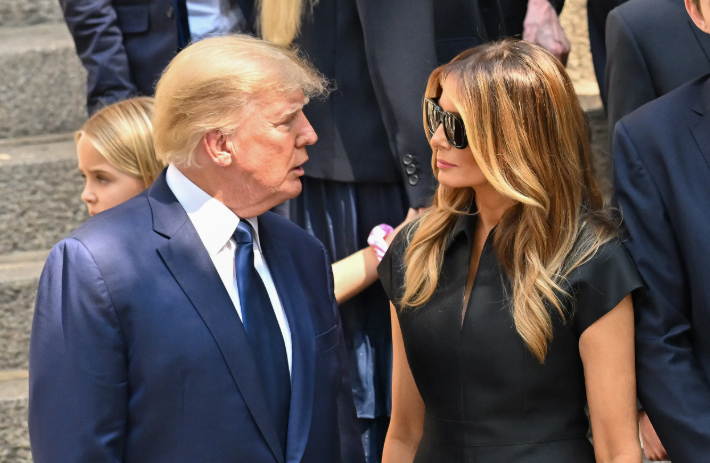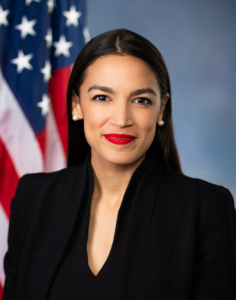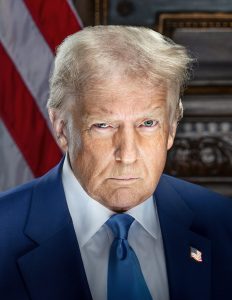As Donald Trump begins his second term in the White House, speculation over the nature of his marriage to First Lady Melania Trump has once again taken center stage—this time fueled by claims from one of the former president’s most persistent chroniclers. Michael Wolff, the veteran journalist and biographer who has written extensively about Trump over the past seven years, recently alleged that the couple is “separated,” despite the image they continue to present to the public.
Appearing on The Daily Beast Podcast, Wolff did not hold back when discussing the Trump marriage, describing it as unconventional at best—and functionally non-existent at worst. His remarks come amid increasing scrutiny over Melania Trump’s unusually low profile during her husband’s return to the presidency, including a report claiming she has spent fewer than 14 days in the White House since his January 20 inauguration.
“They clearly do not in any way inhabit a marriage as we define marriage,” Wolff stated in the interview. “I think maybe we can more specifically say they live separate lives. They are separated. The President of the United States and the First Lady are separated.”
Wolff’s assertion, while unconfirmed, is not without precedent. The nature of Donald and Melania Trump’s relationship has long been the subject of media speculation, often marked by long periods of absence, conflicting public appearances, and what critics have described as a lack of emotional connection. Now, Wolff’s remarks—backed by his years of research and prior publications—are renewing questions about the authenticity of the Trumps’ marital partnership.
A Biographer with a History
Michael Wolff, 71, is no stranger to controversy. The New Jersey-born journalist became a household name in 2018 with the release of Fire and Fury: Inside the Trump White House, a best-selling exposé that painted a chaotic and dysfunctional picture of the Trump administration. He followed that success with Siege: Trump Under Fire (2019), Landslide (2021), and his latest title, All or Nothing, released in early 2025.
All or Nothing chronicles Trump’s turbulent 2024 presidential campaign, in which he narrowly defeated Democratic nominee Kamala Harris in a contentious election. The book delves into campaign strategy, internal White House dynamics, and Trump’s evolving relationships—including the one with his wife.
According to Wolff, the current state of the Trump marriage is not new. Rather, he suggests it is a continuation of a longstanding arrangement in which appearances matter more than intimacy.
“The American public has been sold a bill of goods here—that, you know, Donald Trump and his glamorous wife are some sort of power couple. That runs entirely counter to all of the facts, including the fact that they don’t spend any time together,” Wolff said.
Where Is the First Lady?
Wolff’s comments came just days after The New York Times published a report highlighting Melania Trump’s minimal physical presence at the White House. Citing unnamed officials, the report stated that the First Lady had spent less than two weeks in Washington since her husband resumed office. This is despite her earlier announcement that she would be dividing her time between Washington, New York, and Palm Beach, Florida—where the family’s Mar-a-Lago estate is located.
In her defense, anonymous sources told the Times that Melania is “at the White House more often than the public knows,” although no specific counter-evidence was provided. Critics, including Wolff, argue that the vague rebuttal does little to dispel the perception of estrangement.
“But they didn’t go and say, ‘This is obviously a marriage in trouble,’” Wolff noted, underscoring what he believes is a deliberate effort to maintain a curated public image of unity.
Public Performances, Private Distance
While Melania Trump has made a handful of public appearances alongside her husband—most recently during the signing of the “Take It Down Act,” which she previously advocated for—these moments have done little to convince skeptics that their relationship is built on genuine companionship. During the ceremony, Melania made headlines not only for her presence but for becoming the first First Lady to co-sign a piece of legislation at the president’s request. The unusual move generated both praise and backlash on social media, with some critics accusing her of overstepping traditional boundaries.
The skepticism is not limited to political opponents. Observers across the political spectrum have long noted the awkward body language, prolonged absences, and lack of traditional affection between the Trumps. During Trump’s first term, video clips of Melania appearing to swat away his hand or walk several steps behind him became viral sensations—symbols of what many perceived as a cold, performative relationship.
A Predictable Denial
Unsurprisingly, the White House has rejected Wolff’s claims in the strongest possible terms. Steven Cheung, Trump’s communications director, issued a scathing rebuttal to The Independent, personally attacking the journalist’s credibility and mental state.
“Michael Wolff is an imbecile of the highest order,” Cheung said. “He is a blithering idiot who has been widely discredited due to his blatant lies and fabrications. His Trump Derangement Syndrome-addled brain has caused him to lead a miserable existence devoid of reality.”
Cheung’s statement mirrors the combative style that defined Trump’s first administration, where unflattering reports were often met with personal attacks rather than substantive rebuttals. It also reflects the degree to which Trump and his allies are determined to preserve the image of a stable, cohesive presidential household—even if that image is increasingly called into question.
The Bigger Picture
The scrutiny of the Trumps’ marriage is more than tabloid fodder. In the political arena, the personal is often inseparable from the professional. First Ladies are traditionally expected to play supportive, visible roles—serving as both symbolic figures and policy advocates. Melania’s continued absence from Washington and limited public engagement raise questions not just about her relationship with her husband, but about her role as First Lady during a time of national and international upheaval.
Moreover, the public’s perception of the president’s personal life can influence his approval ratings and political capital. Whether fair or not, images of unity—or the lack thereof—are powerful.
For Michael Wolff, the core issue is transparency. His claim is not merely that the Trump marriage is strained, but that the American public is being misled.
“This is not about whether they love each other or not,” he explained. “This is about the integrity of the image they are trying to project—and whether that image aligns with reality.”
As Trump embarks on what promises to be another polarizing term in office, the questions raised by Wolff will likely persist. Whether his assertions are ultimately validated or dismissed as partisan conjecture, they contribute to a broader narrative that challenges the mythology of the Trump era—one glossy photo op at a time.









